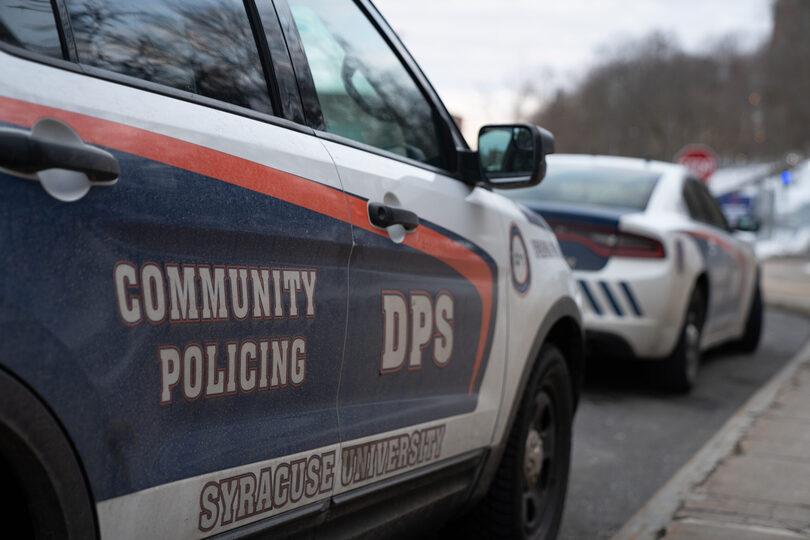DPS improves burglary rates, wave of bias incidents sparks transparency concerns

Of the 14 bias incidents reported in the 2022-2023 academic year, 10 remain on open investigative status. Emily Steinberger | Senior Staff Photographer
Get the latest Syracuse news delivered right to your inbox.
Subscribe to our newsletter here.
Syracuse University’s Department of Public Safety reported a 94.4% drop in reported burglaries this semester after implementing modified protocols to address a pattern of crime on South Campus.
Craig Stone, SU’s associate vice president and chief of campus safety and emergency management services, told The Daily Orange in a May 2 email statement that DPS increased foot patrol and implemented a South Campus burglary suppression detail, which directly contributed to the drop in crime. While reported burglaries plummeted, DPS received backlash from students over a lack of transparency following a wave of reported bias incidents this spring.
Between August 2022 and mid-September 2022, DPS reported 41 residential burglaries in Syracuse’s East Side, 23 of which occurred in the area immediately east of SU’s campus. Between Aug. 22 and Oct. 24, 2021, DPS reported 382 total crimes, 53 of which were on South Campus. Nine of the 53 were either larcenies or burglaries.
DPS also restricted access to South Campus during Thanksgiving and winter break to improve security. It also established a joint effort with the Syracuse Police Department to increase patrols in the East Side neighborhood, which had frequent reports of burglaries and other crimes. Stone said the deployment of additional SPD officers in neighborhoods adjacent to SU led to a reduction in crime near campus.
Despite DPS’ expanded efforts, students said issues with safety still remain on South Campus.
Skyy Sarmiento, a sophomore studying psychology and sociology, lived on South Campus this year and said break-ins were common. Many of her friends, including her roommate, claimed packages were stolen from their South Campus apartments. Sarmiento also noted the difference in safety between on- and off-campus residential areas, even with the added security measures on South Campus.
“It’s kind of unfair that the dorms on campus are so high security. Meanwhile in South Campus, it’s kind of like doing whatever,” Sarmiento said.
Along with students’ concerns over campus security, an uptick in bias incident reports in the spring semester prompted calls for improved communication between DPS and the university community. In March and April, DPS reported eight bias incidents on campus, according to its bias incident tracker.

Arlo Stone | Digital Design Director
Students also expressed frustration after derogatory language directed toward the LGBTQ community was found in Watson Hall and reported to DPS on Feb. 24. DPS did not publicly report the Feb. 24 bias incident until March 2. DPS officials and SU later wrote in a campus-wide notice that DPS delayed communication regarding the incident to avoid jeopardizing its investigation.
Bias-related incidents are typically posted within 48 hours after DPS receives a report unless publicizing it interferes with an active investigation, according to DPS’ bias incident reports website.
Stone told The D.O. that out of the 14 bias incidents reported during the 2022-2023 academic year, 11 were publicly announced within 48 hours. Since DPS first began tracking bias incidents in 2019 following #NotAgainSU, Stone said DPS reported 56 out of 64 total incidents within 48 hours.
Of the 14 bias incidents reported in the 2022-2023 academic year, 10 remain on open investigative status, according to the DPS website.
The University Senate passed a resolution on April 19 calling for DPS to reassess its bias reporting process to improve transparency. The report also asked DPS to include SU community members in their bias reporting process, as well as publish data of incidents on a monthly basis from DPS, the STOP Bias and Hate initiative and the Office of Community Standards.
Jordan Beasley, one of 18 university senators who co-signed the resolution, said he respects the current DPS bias incident policy and its transparency improvement efforts but still called for more clarity behind the process.
When asked if DPS would commit to any of the reforms in the USen resolution, Stone wrote that DPS will maintain its commitment to working with the university community on potential changes to bias incident reporting.
“As we always have with bias incident reporting, we strive to get information disseminated to the campus community as quickly as the process allows,” Stone said.
Stone pointed to DPS community engagement efforts over the past year, like its community police academy and game nights in the Schine Student Center, as well as the Orange Safe app. Stone said Orange Safe currently has 7,200 users, compared to approximately 2,000 users on the previously used Rave Guardian app.
Despite these actions, Beasley said DPS and other university officials must focus on work that benefits and helps students, especially as bias incidents continue to be reported at SU.
“I believe that if they show a conscious effort into being transparent about bias and hate related incidents, that trust will come naturally,” Beasley said. “But it’s going to take time and they have to be willing to put in that work alongside students.”





